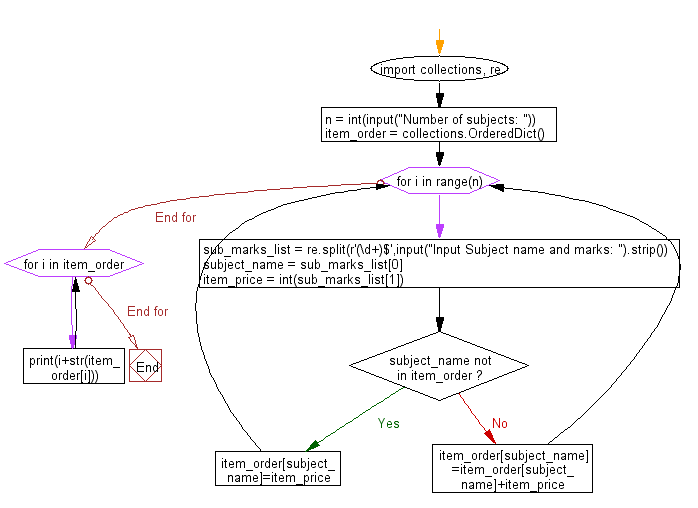Python Exercise: Print subject name and marks in order of its first occurrence
Python Collections: Exercise-6 with Solution
Write a Python program that accept name of given subject and marks. Input number of subjects in first line and subject name, marks separated by a space in next line. Print subject name and marks in order of its first occurrence.
Sample Solution:
Python Code:
import collections, re
n = int(input("Number of subjects: "))
item_order = collections.OrderedDict()
for i in range(n):
sub_marks_list = re.split(r'(\d+)$',input("Input Subject name and marks: ").strip())
subject_name = sub_marks_list[0]
item_price = int(sub_marks_list[1])
if subject_name not in item_order:
item_order[subject_name]=item_price
else:
item_order[subject_name]=item_order[subject_name]+item_price
for i in item_order:
print(i+str(item_order[i]))
Sample Output:
Powered by Number of subjects: 3 Input Subject name and marks: Bengali 58 Input Subject name and marks: English 62 Input Subject name and marks: Math 68 Bengali 58 English 62 Math 68
Flowchart:
Visualize Python code execution:
The following tool visualize what the computer is doing step-by-step as it executes the said program:
Python Code Editor:
Have another way to solve this solution? Contribute your code (and comments) through Disqus.
Previous: Write a Python program that accept some words and count the number of distinct words. Print the number of distinct words and number of occurrences for each distinct word according to their appearance.
Next: Write a Python program to create a deque and append few elements to the left and right, then remove some elements from the left, right sides and reverse the deque.
What is the difficulty level of this exercise?
Test your Python skills with w3resource's quiz
Python: Tips of the Day
Returns False if the provided function returns True for at least one element in the list, True otherwise
Example:
def tips_none(lst, fn=lambda x: x): return all(not fn(x) for x in lst) print(tips_none([0, 1, 2, 0], lambda x: x >= 2 )) print(tips_none([0, 0, 0]))
Output:
False True
- New Content published on w3resource:
- Scala Programming Exercises, Practice, Solution
- Python Itertools exercises
- Python Numpy exercises
- Python GeoPy Package exercises
- Python Pandas exercises
- Python nltk exercises
- Python BeautifulSoup exercises
- Form Template
- Composer - PHP Package Manager
- PHPUnit - PHP Testing
- Laravel - PHP Framework
- Angular - JavaScript Framework
- React - JavaScript Library
- Vue - JavaScript Framework
- Jest - JavaScript Testing Framework

